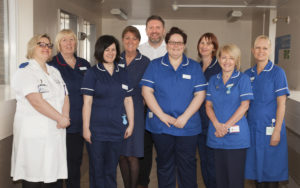 With help from colleagues across three hospital sites, the Infection Prevention and Control (IPC) team have facilitated reductions in patients with MRSA colonisation by 48%, while also beating national targets set for rates of Clostridium Difficile (C.Diff).
With help from colleagues across three hospital sites, the Infection Prevention and Control (IPC) team have facilitated reductions in patients with MRSA colonisation by 48%, while also beating national targets set for rates of Clostridium Difficile (C.Diff).
MRSA (often referred to as a ‘superbug’), if contracted, can be very serious for recovering patients. Similarly, C.Diff is a highly contagious, and an unpleasant type of bacteria that infects the bowel causing diarrhoea and most commonly affects people who have recently been treated with antibiotics.
These reductions, spearheaded by both clinical and medical staff, are due to a number of factors such as increased awareness of the infection amongst the workforce, better antimicrobial training, improved cleanliness and a greater emphasis on monitoring patients who are susceptible to infection.
In all, only 10% of C.Diff cases at the Trust were identified as preventable, marking a huge improvement over previous years. Following this achievement, a report in 2016 on healthcare associated infections demonstrates rates are at a low of 4.6%, far outstripping the national average of 6.6% for the NHS.
This commitment to beating infection was also seen in the Trust’s exemplary performance in tackling flu. For the second year in a row, DBTH was the first acute Trust nationally to vaccinate over 75% of its front line staff, with the flu vaccination being delivered to over 3,500 people in the space of just two months.
Complimenting this proactive work with staff, the Trust has also benefitted for the fourth year from the use of ‘point of care testing’ for influenza using flu screening technology. Using a simple testing device, 79% of patients presenting with flu-like symptoms were diagnosed within 20 minutes, allowing for prompt diagnosis and treatment.
Dr Ken Agwuh, Director of Infection and Control at the Trust, said: “Ensuring our patients are safe while they are in our care is a top priority, and improving our infection control measures is a crucial step in this process. Our Infection Prevention and Control team have been very proactive and, alongside colleagues at the Trust, have shown a real commitment to ensuring our patients receive the highest quality of care, within a safe environment.”
The IPC team continue to strive to make improvements where necessary and intend to promote further compliance with ‘hand hygiene’. With striking posters, informative literature and an industrious use of social media, the team are currently working tirelessly to promote the vital importance of staff washing their hands.
Carol Scholey, Lead Nurse for Infection Prevention and Control, said: ‘’Performing hand hygiene is a crucial part of reducing the spread of infection within hospitals. After all, clean hands are at the very core of infection prevention. This is important to everyone, not just in healthcare, but in everyday life too”.
Looking ahead, the Trust intends to maintain all of the good progress it has made this year and hopes to further reduce infection risks in the future.



